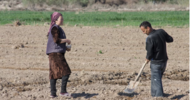The Ethiopian Minister of Agriculture and Rural Development recently released the Land Rent Contractual Agreements for land leases between the Federal Democratic Republic of Ethiopia (FDRE) and twenty-four companies or individuals.
Non-renewable water sources, such as lakes and aquifers, will not withstand significant foreign investment and intense agricultural production.
When land deals were first proposed, they were said to offer the host countries four main benefits: more jobs, new technology, better infrastructure and extra tax revenues. None of these promises has been fulfilled.
- The Economist
-
05 May 2011
Karuturi Global Ltd. may receive an additional 200,000 hectares (494,211 acres) of land from the Ethiopian government if its current 100,000-hectare concession is developed within two years, the Agriculture Ministry said.
Ethiopia achieved positive results in the agriculture sector, which in turn led to improved domestic production and better environmental standards, says UNCTAD.
- UN News Service
-
04 May 2011
"The reports claiming that the Government of Ethiopia has reduced the land concession given to Karuturi Global, are completely baseless," says Sai Ramakrishna Karuturi, Founder & MD, Karuturi Global.
Ethiopia slashed the size of Karuturi’s land concession that was larger than Luxembourg on concern it was too big for a single company to manage and to enable an annual migration of antelope, the government said.
Southeast Asian palm oil firms like Malaysia's Sime Darby and Singapore's Golden Agri Resources are backpacking to Africa, in what could be the planet’s next trend-setter in inter-continental resource trade.
- Commodity Online
-
30 April 2011
From the Middle East to Madagascar, high prices are spawning land grabs and ousting dictators. Welcome to the 21st-century food wars.
- Foreign Policy
-
27 April 2011
The World Food Program intends to buy some of the grain produced in Ethiopia by foreign investors in order to assist hungry people. Ironically, this group of intended food aid recipients will include those working to produce it in the first place. Ethiopia's government is calling this sustainable development.
Governments often justify these deals by citing their potential contribution to economic growth – however, any gains risk being greatly outweighed by negative impacts on local livelihoods, say WRI
"The farmland that we are transferring to foreign investors is not the land that is being used by the locals," asserts Yaregal Aysheshum, former president of the Benshangul Gumuz Regional State in Ethiopia
- The Reporter
-
18 April 2011
Trying to compensate for the absence of legitimacy of these massive land deals by getting investors to adhere to a few principles is deceitful.
- farmlandgrab.org
-
17 April 2011
This study is conducted in order to shed light on and investigate the welfare situation for people affected by farmland investments. It deals with three cases in the Oromia region: Castel Winery, Elfora Agro-Industries PLC and Sher Ethiopia PLC
"Only 12% of [the land investors have acquired in Africa in the last few years] is actually being farmed," Oxfam Senegal's Head of Economic Justice Lamine Ndiaye says. "The other 88% is just sitting there. It's just for speculation. You buy it, and three years later, you sell it at a higher price."
- The Atlantic
-
14 April 2011
It is shameful that the Ethiopian Ambassador to the UK would claim that the areas targeted for foreign investment have no adequate social and economic infrastructures such as education, health facilities and roads.
- Anyuak Media
-
11 April 2011
Several Indian companies have planned huge investments in the African mining and agriculture sectors, buoyed by the prospects of high returns, on the back of rich resources and low labour and input costs, stakeholders maintain.
- Economic Times
-
05 April 2011
Foreign investments help Ethiopia to develop, and provide knowledge, skills and taxes, says Ethiopia's Ambassador to the UK.
Some claim it’s for food security, some say it’s a land grab
- Corn & Soybean Digest
-
01 April 2011
Vast tracts of farmland in poor nations being gobbled up by foreign investors could undermine small farmers' rights and food security in the host countries
Goverment of Ethiopia webpage on land lease contracts (in Amharic)
- Government of Ethiopia
-
29 Mar 2011
A land grab is taking place all across Africa, a transfer of control unprecedented in the post-colonial era.
Foreign investors are leasing vast tracts of land in Ethiopia
One of the problems with so-called ‘land grabs’ is secrecy. Most of the contracts that seal such deals are hidden from public scrutiny, which makes it very hard to establish what is really going on.
- CounterCurrents
-
25 Mar 2011
The company leased 10,000 hectares in Ethiopia’s western Gambella region for 60 years for $9.42 per hectare annually and plans to lease an additional 290,000 hectares from the government.
The Arab unrest has only doubled the efforts of Gulf countries to secure food production by buying farmland around the world, as they try to buffer themselves from the economic issues that have destabilized the region.
- Knowledge@Wharton
-
22 Mar 2011
Locals move out as international contractors seize opportunities offered by government to lease farmland at knockdown rates
What happens when you are forced to leave the land that has fed your family for generations? What is the impact of wealthy foreigners having access to the best agricultural land in a very poor country? These questions addressed in new Guardian film.
Gulf states are following in the footsteps of China and looking beyond their shores to make heavy investments in agriculture
Karuturi's 15 John Deere tractors plough 500 hectares a day on its 300,000 land concession in the Gambella region of Ethiopia. This is land clearance on a gigantic scale.















